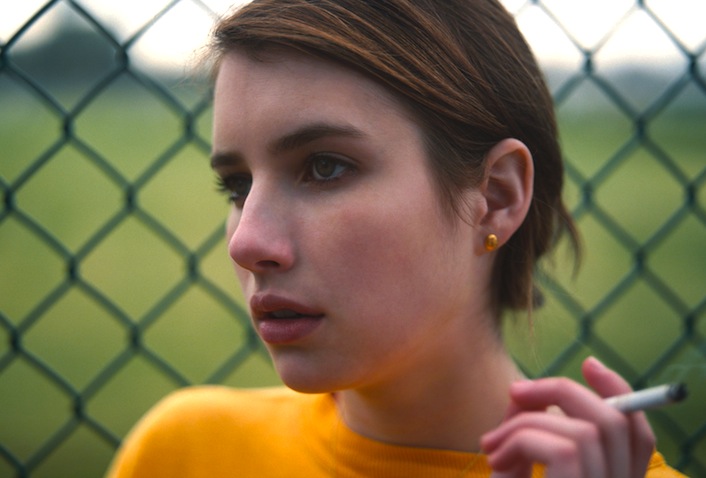
Cinema’s just about old enough at this point that we’ve seen a few three-generation acting dynasties—the Fondas, the Hustons, the Barrymores. But if there’s a family that’s produced three generations of directors, they’re certainly escaping us right now. But enter Gia Coppola. The 26-year-old is, as you might imagine from the surname, the granddaughter of “The Godfather” helmer Francis Ford Coppola, which makes her the niece of his director children Sofia and Roman (Gia’s father, Gian-Carlo, was Francis’ eldest, killed in a boat accident in 1986 not long after her conception).

Having cut her teeth with music videos and commercials, Gia is now entering the family business for real, premiering her first feature “Palo Alto” at the Venice Film Festival. And if the brickbats weren’t going to be out for her purely on the basis of her heritage, the film is led by two other scions of big stars in the shape of Emma Roberts and, in his first acting role, Jack “son of Val” Kilmer, and is based on the collection of short stories by moonlighting A-lister James Franco, who also producers and takes a supporting role. And while the film isn’t as fully formed a debut as, say, Auntie Sofia’s “The Virgin Suicides,” it certainly suggests that plenty of directing talent ended up in Gia’s DNA.
Set in the titular Californian community, the film’s an ensemble teen drama focusing, in family form, on a group of privileged white kids. Events mostly spiral out of a party attended by star-crossed, ennui-suffering pair April (Roberts) and Teddy (Jack Kilmer). They’re totally into each other, but can’t quite articulate that, and when Teddy is seduced by the promiscuous Chrissy (Olivia Crocicchia), April notices and makes out with someone else. As a result, Teddy gets drunk and gets a DUI, forcing him into community service, while April draws closer to her handsome soccer coach, Mr B (Franco). Meanwhile, Chrissy, fed up with being used by guys for nothing more than her oral sex skills, tries to strike up a relationship with Teddy’s bad influence best friend Fred (Nat Wolff, from “Admission“), whose behavior is becoming ever-more self-destructive.
As it might sound, it’s all pretty familiar stuff, indistinguishable on the page from a dozen other teen movies—it’s “Fast Times At Ridgemont High” (a movie which gets a shout-out via a clip of Phoebe Cates‘ most immortal moment) by way of the airline edit of Larry Clark‘s “Kids.” So those tired of the teen movie aren’t going to find anything new to lure them back.

But like the recent “The Perks Of Being A Wallflower” and “The Spectacular Now,” it’s all about the execution, and Coppola Jr. executes things pretty well. Aside from a few “Mean Girls“-ish moments of a broadness that doesn’t sit with the film around them, Coppola’s screenplay neatly restructures Franco’s source material into a deceptively tight narrative, and mostly proves to be raw, authentic and often very funny—particularly when Kilmer Sr. turns up for one of the year’s best cameos.
It’s very strong, technically speaking, as well. First time feature DoP Autumn Durald contributes nicely woozy, unshowy visuals, the cutting is organic and intuitive, and there’s a terrific indie-synth score by Dev Hynes (Test-Icicles, Lightspeed Champion and Coppola cousin Robert Schwartzman of Rooney), whose mother Talia Shire also contributes a strong cameo. The film’s as much about tone as anything, and Coppola does more to capture her characters’ listlessness with the filmmaking than you’d think possible for a first timer.
She’s also cast it beautifully. Kilmer Jr. is quite a find, reminiscent of his pops while also establishing his own distinctive screen presence, while Roberts, who for a while has been a promising performer in search of the right role, hits her stride here, making a difficult character genuinely sympathetic. Best in show is Wolff, who impressed in the otherwise unremarkable “Admission” a few months back, but is even better here as a twisted, infuriating version on the Ferris Bueller archetype.
The film overstays its welcome a touch and ultimately feels fairly disposable, simply due to how well-trodden the territory is. But it’s still a strong and soulful debut from Coppola (whose aunt must be feeling a bit shown up—it’s a much more textured and convincing take on the rich-youth-gone-wild tale than “The Bling Ring“). We look forward to seeing much more from her down the line. [B-]
Browse through all our coverage of the 2013 Venice Film Festival to date by clicking here.

